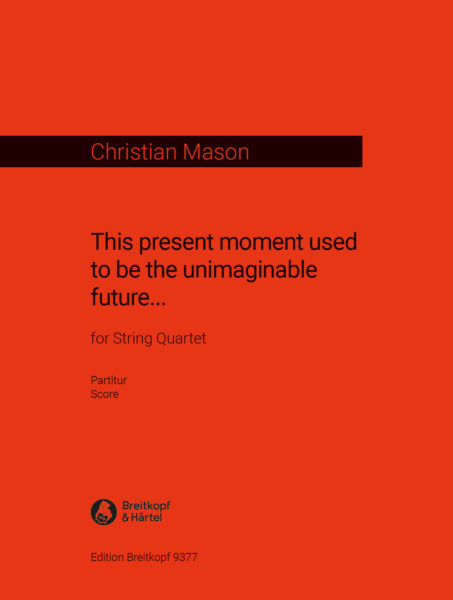Christian Mason (*1984) This present moment used to be the unimaginable future...
[2Vl,Va,Vc] 2019 Dauer: 20'
Uraufführung: Paris, Cité de la musique, 14. Januar 2020
Auftragswerk der Kölner Philharmonie (KölnMusik) für das "non bthvn projekt" 2020 und der Cité de la musique / Philharmonie de Paris
Hier können Sie in EB 9387 blättern.
Nachdem Sie die gewünschten Ausgaben in den Warenkorb gelegt haben, können Sie dort die benötigte Stückzahl bei Bedarf noch anpassen.
Jeder Satz dieses Quartettes erforscht einen einzigen Zustand, sein Licht und sein Schatten. Jeder Satz – so könnte man sagen – ist ein Augenblick. Und jeder dieser Augenblicke könnte eine längere oder kürzere Zeit andauern, ohne seine eigentliche Natur zu verleugnen. Die Prozesse können verlängert oder gestaucht, wiederholt oder rückwärts gespielt werden, aber die Kernideen – wenn sie überhaupt Ideen sind, vielleicht sind sie nur Erfahrungen – bleiben, was sie sind. Nichtsdestotrotz ist die genaue Abfolge der Sätze von entscheidender Bedeutung. In Gänze angehört artikulieren sie eine Art linearer Geschichte, vielleicht sogar eine metaphorische Reise (wenn auch eine zirkuläre, bei der die Ankunft, wer weiß, sich als ein neue Abreise herausstellt). Eine Situation löst die vorhergehende ab und die Beziehungen der Instrumente im Quartett verändern sich, aber schlussendlich bevorzugt der imaginative Impuls hinter dem Stück den Zustand der Einheit.
Ob diese Einheit textural ausgedrückt wird oder nicht – manchmal durchdringen das Stück wörtliche Unisoni, aber nicht immer – es gibt immer das grundlegende Gefühl, dass auch die scheinbar verschiedenen Aspekte sich auf einen fundamentalen Zustand der Übereinstimmung beziehen: eine bewusste Beschränkung der Tonhöhenstruktur auf spektrale Bestandteile der Grundtöne Es und C. Zu Beginn des Stückes ist dies unzweideutig hörbar im stetigen Wechsel dieser beiden Töne im tiefen Celloregister. Später werden die zwei Spektren in einem mikrotonalen „Doppel-Spektral-Modus“ miteinander verwoben (der von den ersten 24 Obertönen der Grundtöne C und Es abgeleitet ist), der dann auch sowohl die subtile melodische Flexion des zweiten Satzes definiert, als auch die niemals-so-ganz chromatischen Skalen des dritten. Bis hierhin scheint es nach einer reichhaltigen Quelle von melodischen Möglichkeiten auszusehen, wenn auch nur für einen kurzen Augenblick …
Und woher rührt das Insistieren auf dem Es? Wahrscheinlich von einer historischen Anekdote. Anscheinend sagte Karl Holz (ein Mitglied des Schuppanzigh-Quartetts) zu Beethoven: „Wir haben Ihr Quartett in Es-Dur Op. 127 zu seinen [Webers] Ehren aufgeführt; er fand das Adagio zu lang; Ich antwortete ihm: Beethoven hat ein langwierigeres Gefühl und eine langwierigere Vorstellungskraft als sonst jemand, tot oder lebendig. – Seitdem kann keiner mehr ihn leiden, nicht einmal mehr Linke [ein anderes Mitglied des Quartetts]: Das können wir ihm nicht verzeihen.“
Unter dem Eindruck dieser Äußerungen hörte ich Op. 127 erneut an und war wie getroffen vom ersten Satz: der Entfaltung eines Es-Dur-Septakkordes über die Spanne einiger Takte hinweg. Jedesmal beim Anhören ertappe ich mich bei dem Wunsch, Beethoven hätte länger dabei verweilt, ohne Auflösung oder Fortschreitung, nur diese Klanglichkeit genießend. Und hätte vielleicht – warum nicht? – die Septe natürlich intoniert. Und wie würde es aussehen, wenn man diesen Augenblick auf ein ganzes Stück ausdehnt? Was würde Weber darüber denken?! Schlussendlich war ich nicht ganz so extrem in meiner Selbstbeschränkung, andere Überlegungen traten in den Vordergrund, aber aus diesen Gedanken heraus begann ich die Komposition …
Schlussendlich zum Titel: Er ist dem Buch The Clock of the Long Now von Stewart Brand entnommen, das um die Jahrtausendwende herum erschienen ist. Es handelt von der Erschaffung einer tausendjährigen Uhr, die das Streben nach einem Denken in längeren als den gegenwärtig üblichen Zeiträumen verkörpert. Wenn die Musik Beethovens ein „langwierigeres“ Gefühl und eine „langwierigere“ Vorstellungskraft verkörperte als seine Zeitgenossen würdigen konnten, wie ist dann heute unser Verhältnis zur Zeit? Länger oder kürzer? Vielleicht hängt das davon ab, wen man fragt … wahrscheinlich ist es extremer in beide Richtungen geworden: Die Aufmerksamkeitsspanne in der digitalen Welt mag geschrumpft sein, andererseits haben wir ein Bewußtsein von weit zurückliegenden Vergangenheiten und möglichen Zukünften, die für einen Zeitgenossen Beethovens unvorstellbar gewesen wären. In jedem Fall ist es interessant, darüber nachzudenken, wie soziale Umstände, Annahmen und Erwartungen – bewußt oder unbewußt – die Zeit der Kunst für Zuhörer und Komponisten zugleich beeinflussen.
Und was, wenn uns die Zeit ausgeht?
(Christian Mason)
| 1. Supernal: with a fluid sense of time |
| 2. Breathing: gentle, luminous, intimate, as if time hardly existed... |
| 3. Lost in a mist… |
| 4. Joyfully resonant: with a sense of transparency |










 Blättern
Blättern